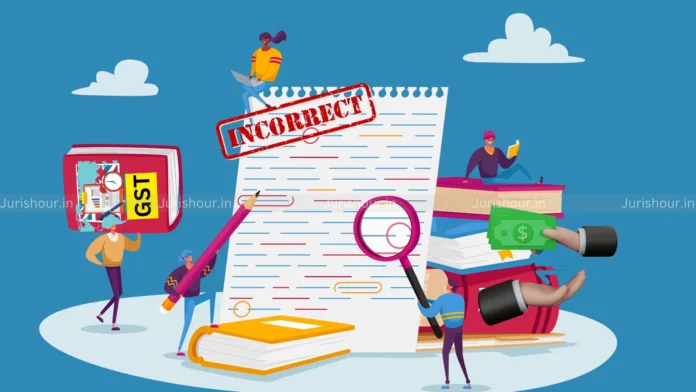The Punjab & Haryana High Court in the case of Bar Code India Limited Versus Union of India held that the GST Number of purchasers in GSTR-1 return cannot be rectified after expiry of the limitation period.
The bench of Justice Sanjeev Prakash Sharma and Justice Sanjay Vashisth has observed that If there is a correction in the corresponding GSTR-1 within the timeline, ITC would be permissible in terms of the timeline specified in Section 64 of the Act, therefore, the petitioner cannot be permitted to rectify the return beyond the statutory time limit prescribed under the GST Act.
The bench stated that even if the petitioner is allowed to rectify the return now, there will not be an automatic benefit of income tax credit, which the purchaser can claim. Had the petitioner detected its error prior to filing of annual return, it could have simply rectified the same in the GSTR-1 for that month as the common portal allows rectification of such error till the filing of the annual return.
Table of Contents
Background
The petitioner/assessee company has issued invoices to the purchaser for financial year 2021- 2022 where erroneously at the time of filing of GSTR-1 return, the petitioner company made certain inadvertent errors by mentioning the point of sale as Mumbai instead of Delhi and also mentioned the GST number of the receiver/ purchaser of Mumbai instead of GST number of the purchaser in Delhi.
The petitioner submitted that theerrors in the GSTR-1 return filed the petitioner came to their knowledge after the concerned purchaser notified the error to them somewhere in the month of April 2023 as they found difficulty to avail GST input tax credit.
The purchaser refused to clear the other invoices of the petitioner. Immediately,the petitioner sent a letter dated 18.08.2023 to department praying for allowing them to make necessary amendments in their return relating to the three invoices issued on 13.05.2021.
The department, however, rejected the prayer on account of there being no provision to make amendments after the time period laid down under the Rules had expired. There was no provision also to make amendments by a manual request.
The petitioner submitred that the petitioner company ought not be made to suffer on account of inadvertent human error which is apparent on the face of the record having occurred without there being any deliberation on part of the petitioner. The business of the petitioner company is seriously affected on account of the said refusal to make the correction.
The department contended that the Act allows ample time to rectify the errors. The time limit as laid down in Section 37(3) of the Act cannot be allowed to be altered for a particular company and they will have to bear the loss as no general rule can be laid down and there cannot be an open ended time frame for corrections/ rectifications.
The department argued that the time frame has been aligned with the further time provided for furnishing of audit report for the respective financial years. There is a cascading effect on the other processes and it is important to conclude the entire process in the timeline.
The department contended that merely by rectifying Form GSTR-1 at this stage would not automatically allow the concerned recipient tax payer to claim ITC now as the same has also become time barred in terms of Section 16 (4) of the Act. It is further pointed out that after submitting GSTR-1 by the supplier, GSTR-2A auto generates for the recipient supplier. The same becomes a basis for claiming input tax credit under the GSTR-3B.
The department submitted that input tax credit can be availed till the date on furnishing of the return as provided under Section 39 of the Act i.e. by the month of September following the end of financial year for which the invoice or debit note pertains or the date when the relevant annual return is furnished, whichever is earlier. The correction in the corresponding GSTR-1, therefore, is permissible in terms of the timeline.
Issue Raised
The issue raised was whether the petitioner can be permitted to rectify/ amend the GST number of the purchaser in GSTR-1 return with respect to the invoices dated 13.05.2021 (on account of human error) for the quarter ending 30.06.2021 after the limitation period is expired in terms of Section 37(3) of the Central Goods and Services Tax Act, 2017.
Conclusion
The court noted that as per Section 16 (4), a registered person shall not be entitled to take input tax credit after the due date of furnishing of the return under Section 39 for the month of September following the end of financial year to which such invoice or debit note pertains or furnishing of the relevant annual return, whichever is earlier.
The court held that merely because of an error being committed by a particular company, which causes loss to the purchaser company, the provisions of the Act need not be interpreted to suit them. The law is settled that a person who is engaged in business has to be well versed with the provisions of law including the time frame provided under the provisions. Both the companies, as asserted by the respondents, are engaged in business for a long time and if they have committed an error, the law cannot be changed for giving them any such benefit.
The court rejected the claim of the petitioner for correction of the return.
Case Details
Case Title: Bar Code India Limited Versus Union of India and others
Case No.: CWP No. 25343 of 2023 (O&M)
Date: 14.11.2024
Counsel For Petitioner: Simarpal Sawhney
Counsel For Respondent: Ajay Kalra





